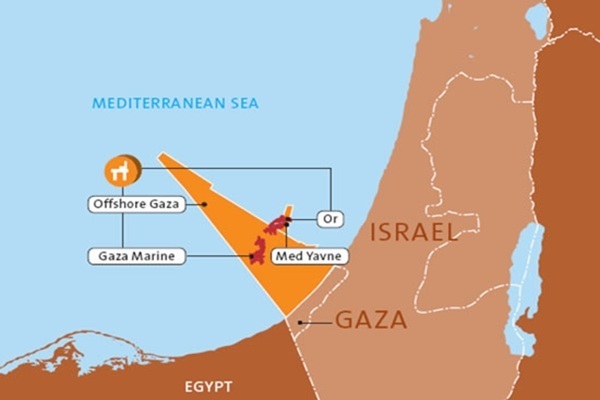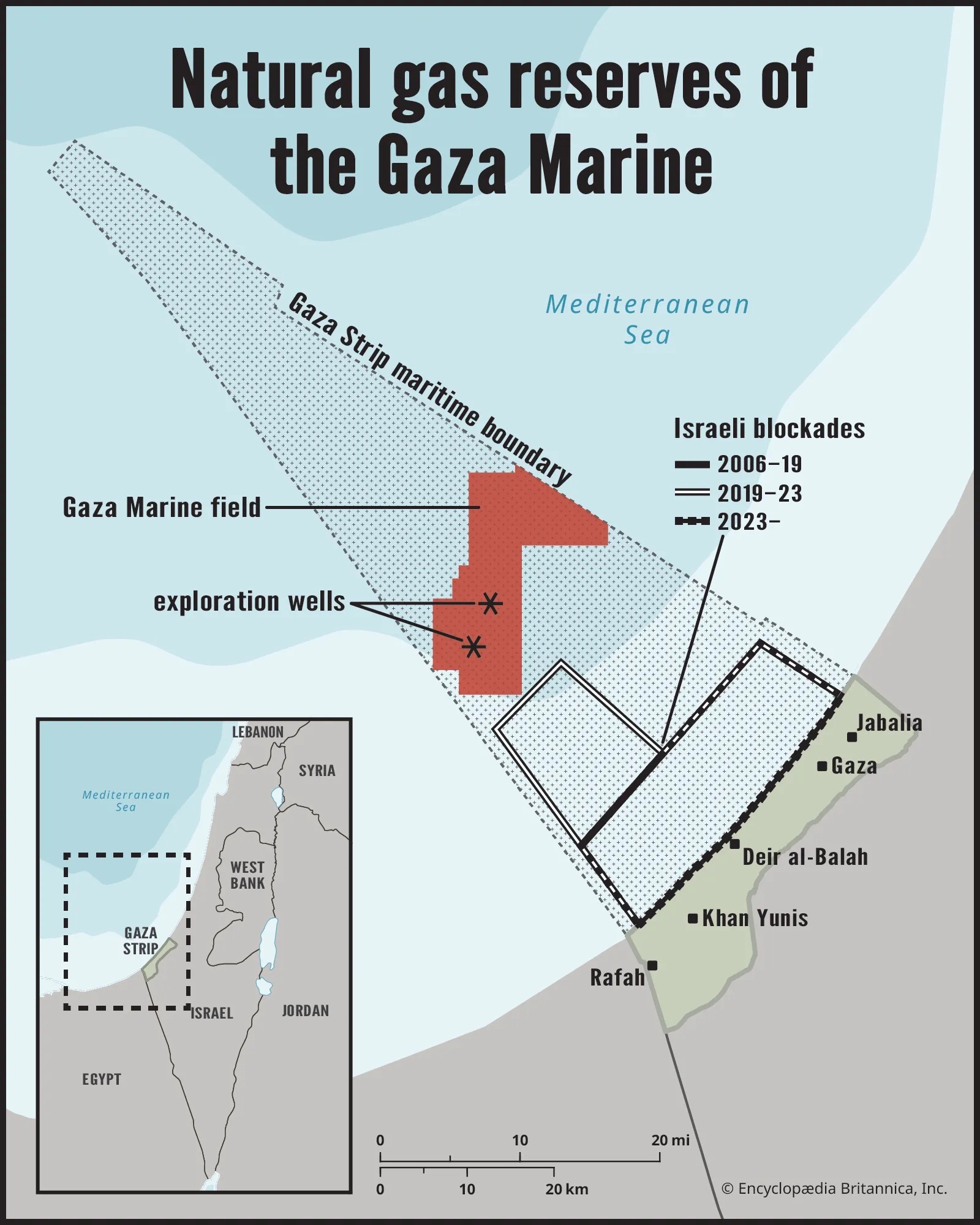Israel's Plan to Plunder the Gaza Marine Gas Field
TEHRAN (Defapress) - The Gaza Marine gas field, located off the coast of the Gaza Strip, is a strategic resource with high economic potential for Palestine, but has long been at the center of legal and political disputes. Situated approximately 35 to 36 kilometers (20 to 22 nautical miles) west of Gaza City in water depths of about 603 to 610 meters, the field was first discovered in 1999 by British Gas (BG) using seismic technology. Subsequent exploratory and appraisal drilling (Gaza Marine 1 and Gaza Marine 2) in 2000–2001 confirmed commercially viable reserves.

This field holds significant economic potential for the Palestinian territories, particularly the Gaza Strip, which faces chronic energy shortages and economic challenges. Developing the field could provide a stable energy supply, generate substantial revenue through exports to regional markets, and enhance Palestinian economic independence. Estimates suggest that its gas reserves could meet Gaza’s energy needs for decades and even enable exports to neighboring countries, fostering regional energy cooperation.
Following the field’s discovery by British Gas in 1999, then-Israeli Prime Minister Ehud Barak initially authorized exploration in the area. In July 2000, he granted BG a security permit to drill the first well, named Marine-1, an action seen as a form of political recognition, though lacking legal obligation by Israel, implying that the well fell within the jurisdiction of the Palestinian Authority (PA).
When the exploitation license was granted to BG in 1999, a key condition was the sale of surplus gas to Israel. Tripartite negotiations among BG, the Palestinian Authority, and the Israeli government began in the summer of 2000, framed within the economic cooperation outlined in the Oslo process, as Israel had a pressing need for gas at the time. However, Israel’s refusal to pay market prices for the gas led to a deadlock in negotiations. In July 2000, the Palestinian Authority agreed to BG’s proposals to build a pipeline to a processing facility in the Gaza Strip, and the overall field development plan was approved in 2002. Additionally, in 2001, Barak symbolically transferred ownership of the field to the Palestinians, delineating a hypothetical maritime boundary that placed the entire Gaza Marine gas field within Palestinian waters.
Since 2003, the Israeli government has consistently halted the development of the Gaza Marine gas field. An Israeli gas consortium, Yam Tethys, protested the allocation of the license to BG, causing further delays in the project. The consortium urged the Israeli government to prevent BG from drilling off Gaza’s coast, arguing that the Palestinian Authority lacked sovereignty. Additionally, in 2002, Israel delayed BG’s proposals to build a pipeline to the Gaza Strip, instead suggesting that the pipeline be redirected to a port under Israeli control, with surplus gas offered to Palestinians at below-market prices.
Following Hamas’s victory in the 2007 Palestinian legislative elections, Israel imposed a military naval blockade on the Gaza Strip, prohibiting offshore field development. In December 2008, Israel declared sovereignty over the Gaza Marine field, an action widely described as a “clear violation of international law,” resulting in the closure of BG’s offices in Tel Aviv. Royal Dutch Shell acquired BG’s interests for $52 million in 2016 but withdrew from the project in March 2018, primarily due to the field’s small size and ongoing political challenges, leaving the Palestinian Authority to seek a new partner for development.

During this period, Israel discovered significant gas fields, including the Tamar field in 2009 and the Leviathan field in 2010, reducing its initial reliance on the Gaza Marine gas. Despite changes in the stated reasons for obstructing the project, the primary goal, maintaining control and leverage over Palestinian resources, remained consistent, reflecting the deep politicization of natural resources in conflict zones.
After Shell’s withdrawal, the Consolidated Contractors Company (CCC) and the Palestine Investment Fund (PIF) acquired its interests, each holding a 50% stake in the project. Subsequently, the Palestinian cabinet approved a new ownership structure, with PIF and CCC Oil & Gas each holding a 27.5% share. Since 2022, renewed interest in developing the Gaza Marine field has emerged, largely driven by the global energy crisis following the Russia-Ukraine war and the destruction of the Nord Stream pipeline. These developments provided further impetus for regional energy diversification. Joint meetings involving Israeli, U.S., Egyptian, Jordanian, and Palestinian officials were held to discuss the project. Notably, U.S. President Joe Biden and Egyptian authorities pressed Israel to expedite the project.
On June 18, 2023, Israel issued preliminary approval for the development of the gas field off Gaza’s coast. Israeli Prime Minister Benjamin Netanyahu announced that the project’s progress would be contingent on “preserving Israel’s security and diplomatic needs” and coordination with the Palestinian Authority and Egypt.
On October 29, 2023, amidst extensive Israeli military operations in the Gaza Strip, Israel announced the issuance of 12 new licenses for offshore natural gas exploration to six companies, including British Petroleum and the Italian energy company Eni. Notably, 62% of Zone G, 5% of Zone H, and 73% of Zone E, where licenses were issued or put up for tender, fall within the maritime boundaries declared by the Palestinian government in 2019, by the United Nations Convention on the Law of the Sea (UNCLOS). This action has been described by Palestinian human rights groups as de facto/de jure annexation and a clear violation of international law. The issuance of these licenses, even during military operations, indicates an ongoing and deliberate trend, not an isolated event, but a continuation of Israel’s assertion of sovereignty over the Gaza Marine field since 2008. This reflects a long-term strategic goal to consolidate Israel’s control over regional energy resources, irrespective of international legal considerations or dire humanitarian conditions.
Under Article 77 of the 1982 UN Convention on the Law of the Sea, the coastal state, in this case, Palestine, has exclusive rights to the natural resources of its continental shelf, including the Gaza Marine gas field. Article 56 of the convention also guarantees the coastal state’s rights over its exclusive economic zone (EEZ). However, by issuing exploration and extraction licenses in Palestinian maritime areas, Israel has violated these rights and undermined the principle of Palestinian national sovereignty. These actions contravene Article 2 of the UN Charter, which emphasizes respect for state sovereignty. Furthermore, Israel justifies its claim to these resources by citing the absence of a formal maritime boundary agreement, an argument that contradicts Articles 74 and 83 of UNCLOS, which require states to resolve boundary disputes peacefully through negotiation or mediation. Israel’s refusal to engage in fair negotiations has deprived Palestinians of their right to exploit their natural resources, constituting a clear violation of international legal obligations.
The Gaza Marine gas field, despite its vital economic potential for the Palestinian people, is deeply entangled in geopolitical, legal, and military conflicts. Although international law recognizes Palestinians as the rightful owners of the field, the historical trajectory of its development demonstrates that competition over natural resources transcends legal considerations, shaped by the balance of power and regional strategic interests. Israel, through political, economic, and military means, has not only disrupted the legitimate exploitation of the field by Palestinians but is also seeking to consolidate its unilateral control over this strategic resource.
The destruction in Gaza, which exceeds any military justification, appears designed to reduce the resident population and weaken economic infrastructure to facilitate Israel’s access to the Gaza Marine gas field. These actions also violate Article 33 of the Fourth Geneva Convention, which prohibits collective punishment of civilians, as the widespread destruction of infrastructure has plunged millions into crisis and devastated their livelihoods.
The ultimate goal of this destruction is to create conditions that force Palestinians to leave the area, enabling Israel to access the gas resources at a lower cost, resources that not only meet Israel’s domestic energy needs but also hold potential for export to global markets.
